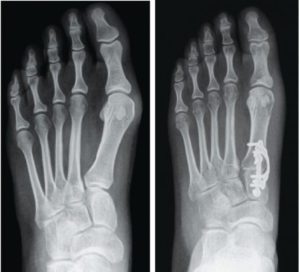
R: Lapiplasty
A form of arthritis can cause painful, red, boney, growths; consequently, bunions can also be hereditary and run in families, especially in females, generation after generation. More women than men experience the painful boney growth on their big toe, known as a bunion, or Hallux Valgus. One of the leading exacerbations of a bunion is from wearing shoes that are too tight, too narrow or too high. All of this causes pressure on your toe joint, which in turn starts to ache, become fluid filled and can have boney growths.
You Have Options
For a conservative approach, many individuals will start out trying to alleviate their pain by wearing more comfortable shoes, or by wearing gel toe inserts that help keep the toes in the proper alignment. Icing the foot can help to tamp down inflammations, as well as taking NSAID’s (ibuprofen) as needed to lessen the discomfort.
When the conservative approach begins to stop working, which is not unusual, as most bunions fail to heal on their own, surgery is the definitive answer.
In traditional bunion surgery, the toe bone is cut in half, and part of the bone is removed. In many cases, there is a need to relieve tension on surrounding ligaments and tendons to try and realign the joint and bones. The total recovery can take a few months, but initially, you will be in a protective boot or cast for the first two to four weeks.
The problem with traditional surgery is that it doesn’t address the root cause of the bunion deformity, but rather temporarily or cosmetically removes the boney growth, leaving the real deformity, which is midfoot, unaddressed.
That’s why it’s not uncommon for bunions to return after surgery.
In reality, bunions are complex 3D deformities caused by an unstable joint which allows your bone to lean, elevate, and rotate out of alignment.1
There is a better way!
A procedure called Lapiplasty®, which is a 3D surgical approach, fixes the 3D deformities at the core with a minimally invasive approach. Instead of cutting and removing bone, it corrects the deformity at the mid-bone malformation (metatarsal bone) without unnecessary bone removal. Lapiplasty® moves the metatarsal bone back into its normal position and secures it there permanently. You’ll never need another surgical or therapeutic intervention for the bunion again.
How the Lapiplasty® Procedure works
The Lapiplasty® Procedure naturally restores your natural anatomy. There’s no need to cut and shift the normal metatarsal bone as with osteotomy (2D surgery). The entire metatarsal bone is simply rotated and shifted back into position, eliminating the unsightly bump. And, the unstable foundation is permanently secured with patented, titanium technology allowing you to get back on your feet quickly!1
This 3D approach not only treats the root cause of the bunion, but it also repositions the toe and foot alignment precisely as it once was, and it lessens the healing time significantly, and it’s permanent.
BUNIONS ARE PAINFUL! It’s always best to be proactive and get them treated before they get too advanced.
A podiatrist will evaluate your symptoms and pain level, and from there create an individualized plan for your best treatment options. They will provide you with the best solution for your needs.
Mid Florida Foot, Ankle & Vein Clinic provides pain-reducing, comprehensive, cutting-edge treatment. Their podiatrist, Dr. Gabriel Delgado, can treat all foot problems and even performs in-office surgeries. Rest assured you’ll get patient-focused care from their highly skilled and compassionate staff.
To find out more, or to schedule your appointment, please contact Mid Florida Foot, Ankle & Vein Clinic today.
Middle Florida Foot, Ankle and Vein Clinic
Dr. Gabriel F Delgado FACFAS
Lakeland Office
203 Kerneywood St.
Lakeland, FL 33803
Bartow Office
510 West Main St.
Bartow, FL 33830
863-686-1641
 Central Florida Health and Wellness Magazine Health and Wellness Articles of the Villages
Central Florida Health and Wellness Magazine Health and Wellness Articles of the Villages



